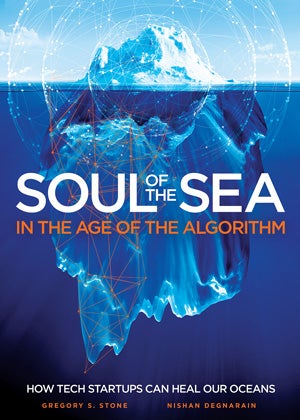The Soul of the Sea

Boston-born Greg Stone, M.M.A. ’89, emptied five SCUBA tanks a day collecting scallops in Maine’s winter waters to help pay for college. He liked diving so much he decided to make a career of it. When he first started his studies, there were no textbooks on marine biology; his professors used to staple published science papers together for their course work.
Today, with advanced degrees in marine policy (from URI) and marine science, Stone is one of the few ocean scientists in the world who combines first-hand diving experiences—from Antarctica to the equator, and from the shallows to 18,000-foot submarine dives that involve spending 10 straight days in underwater saturation habitats—with attendance at gatherings of nations and international business. Paris climate agreement? Stone was there, and at the World Economic Forum’s Davos confab. All the meetings and travel are part of his search to find ways for humanity and the ocean to co-exist and support each other in the modern world.
Stone’s work on sustainable aquaculture, climate adaptation and seamount ecology can be found in TED talks and documentaries for Discovery and National Geographic. Now chief scientist for oceans at Conservation International and special advisor on oceans for the World Economic Forum, he has authored hundreds of publications, including four books. An introductory passage from his most recent book, Soul of the Sea in the Age of the Algorithm, is excerpted here. The book examines the importance of the sea as a driver of human well-being, warns of the current decline in ocean health, and explores solutions through fields such as technology, governance, and innovation. •
The Ocean and Our Collective Soul

Whenever we look to our past or present-day cultures that have uninterrupted links to a sustainable relationship with the ocean, we see that the ocean and water have always had special significance. Some Pacific Islanders even refer to islands and dry land as “holes in our ocean.” The ocean forms the basis for the entire planetary hydrosphere: Water on earth is locked in a perpetual cycle of evaporation from the ocean as pure distilled water, then transportation in clouds for redeposition on land and sea. The water that flows on land rejoins the ocean, along with the minerals and salts of which it becomes so richly comprised. When you view the water cycle in this grandiose way, the ocean starts in the clouds, extends down every mountain and river and into the sea. And the magic ingredient is the remarkable water molecule. Water, the universal solvent, is capable of dissolving more different things than any other known liquid, and it is the only substance that exists in all three of its phase states (solid, liquid and gas) on earth.
These remarkable qualities did not go unnoticed by ancient humans, who, throughout the course of their lives, saw how important water was. Their understanding was based on empirical experience and knowledge rather than the scientific research we have today.
The high value they placed on water is represented in the dizzying array of ancient water and ocean gods found in almost every ancient culture for which there is a record, ranging from the Greek and Roman to Slavic, Hebrew, Korean, and Filipino. The Chinese, for example, had Mazu, the Fujianese shamaness and Yu-Kiang, who ruled the sea in the form of a whale with arms and legs. Australian Aboriginal mythology has Eingana, a creator goddess and the mother of all water animals as well as humans. Ezili, in Benin mythology, is the goddess of sweet water, beauty, and love. The Norse, Germanic, and Celtic peoples also all have their own aquatic connections to the metaphysical.
No lesser leader than President John F. Kennedy poetically described his connection to the seas in 1962.
…We are tied to the ocean. And when we go back to the sea, whether it is to sail or to watch it, we are going back to whence we came.
—Greg Stone, M.M.A. ’89
 Home
Home Browse
Browse Close
Close Events
Events Maps
Maps Email
Email Brightspace
Brightspace eCampus
eCampus


